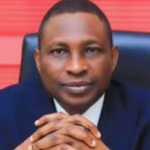
Biden looked to hit back, but his delivery was faltering as he spoke rapidly in a raspy, trailing-off voice, stumbled on his words and stared open-mouthed.
His performance, after he spent the week secluded in preparation, sparked new concern within his Democratic Party as polls show Trump is tied or ahead for the November election.
It was the first debate ever between a president and former president — and each accused each other of being history’s worst.
Trump and Biden, who were each the oldest president when first elected, even accused each other of being childlike as they argued over their golf swings.
Biden, 81, and Trump, 78, did not shake hands as they walked to their podiums at the CNN headquarters in Atlanta. There was no live audience and their microphones were muted as the other spoke.
Biden, who was said to have a cold, hit Trump with clearly rehearsed lines as he sought to remind millions of television viewers that Trump would be the first convicted felon in the White House.
“You have the morals of an alley cat,” Biden said.
Trump, a veteran of rallies and reality television, spoke loudly as he ran through a long list of complaints about Biden’s record.
“I’m friends with a lot of people. They cannot believe what happened to the United States of America. We’re no longer respected,” Trump said.
Trump sought to seize on Biden’s delivery, saying at one point, “I really don’t know what he said at the end of that sentence. I don’t think he knows what he said either.”
‘Slow start’
Vice President Kamala Harris went into damage-control mode.
In a live interview on CNN, Harris said Biden’s record was “extraordinarily strong” but acknowledged concerns about his debate.
“Yes, there was a slow start, but it was a strong finish,” Harris said.
Kate Bedingfield, a former Biden communications director, said on CNN that “it was a really disappointing” evening for the president.
“I don’t think there is any other way to slice it,” she said.
A CNN poll found 67 percent of debate watchers thought Trump had won the event.
Democrats are set formally to name Biden as their candidate in August in Chicago, with little way to change course unless the president himself withdraws.
Biden has sought to counter attacks by Trump who say he is not vigorous enough for the job.
But Julian Zelizer, a historian at Princeton University, said Biden’s supporters would be “extremely concerned.”
“Biden fueled the basic perception that has continued to overshadow him,” he said.
At a watch party in San Francisco, Hazel Reitz said she would still vote for Biden but added: “I can’t understand a word that he says. Isn’t it sad?”
Personal attacks
Neither candidate laid out new policies, with most of the exchanges consisting of attacks on the other’s record.
In one of the most personal moments, Biden cited accounts that Trump had described soldiers who died in the Normandy landing as “suckers” and noted his own son Beau, who served in Iraq and later died of cancer.
“My son was not a loser, was not a sucker. You’re the sucker. You’re the loser,” Biden said.
Trump denied the remarks and repeatedly accused Biden of not being coherent.
On foreign policy, Trump accused Biden — who faces a backlash from parts of his Democratic base over his support for Israel — of not helping Israel “finish the job” against Hamas.
“He doesn’t want to do it. He’s become like a Palestinian — but they don’t like him because he’s a very bad Palestinian, he’s a weak one,” Trump said.
Trump described Biden’s withdrawal from Afghanistan as the “most embarrassing moment in the history of our country” and said it encouraged Russia to invade Ukraine.
Biden, however, noted that he was the first recent president who has not had soldiers at risk overseas.
Trump and Biden also locked horns over abortion and immigration, key issues for their respective bases.
Biden, attacking Trump for appointing justices to the Supreme Court who ended Roe vs. Wade, the decision that allowed abortion rights around the country, said: “It’s been a terrible thing, what you’ve done.”
One candidate not on the stage was anti-establishment activist Robert F. Kennedy Jr., who failed to meet CNN’s threshold of reaching 15 percent in four national polls.
Kennedy instead spent the 90 minutes taking questions on a livestream.
AFP












